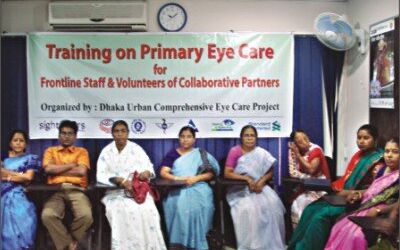Dhaka Urban Comprehensive Eye Care Project (DUCECP) has incorporated new features in its ongoing five year project to bring more people under its comprehensive eye care services. The project’s focus is to provide treatment care at minimum to free of cost more on hard to reach poor and extreme poor people living in Dhaka city.
The project that started on October 2008 has targeted 33,000 cataract surgeries, 67,000 free spectacles to correct refractive error, 2,100 training sessions to the frontline staffs and screening of mass population including school children by September 2013.
DUCECP is funded mostly by the Standard Chartered Bank’s Seeing is Believing (SiB) initiative and Sightsavers International, UK based charity on eye care.
Till December 2009, approximately 8,558 people have got their sight restored after successful cataract surgeries with the support of this project. Besides surgeries, 65,672 urban people and 1,423 school children, mostly poor, have been examined and 4,082 free glasses have been distributed. Along with the leading cause of blindness — cataract, they have programmed to intensify their efforts in other eye care services like refractive error, low vision, dacryocystitis (inflammation of the tear sac), squint, Pterygium (growth in the conjuctiva) and operations like DCT, DCR.
Moreover, they have conducted primary eye care training sessions to over 500 front-line staffs of their collaborative partner organisations. Now they have scheduled extensive training sessions for people from different sections of the society to create widespread awareness in the community.
The project is covering 15 constituencies of Dhaka city with the support of more than 50 collaborative partners organisations. The DUCECP has four partner hospitals — Islamia Eye Hospital at Farmget, Bangladesh National Society for the Blind (BNSB), Dhaka Eye Hospital at Mirpur, Ad-Din Hospital at Maghbazar, Salauddin Specialised Hospital Ltd. at Hatkhola to provide operative and other in-patient services for eye diseases. Experienced ophthalmologists of those hospitals provide the eye care treatment to the poor people.
DUCEC Project Coordinator M Nurun Nabi informed Star Health that they have made designed such a wonderful pro-poor programme, from where they get the maximum benefit to get treated their eye problems. Bringing poor people like, rickshaw pullers, day labourers, street children, garment workers, low-income households and street vendors who can not afford costly eye treatment are the major concern of this project.
Source: The Daily Star, February 26, 2010






Leave a Reply